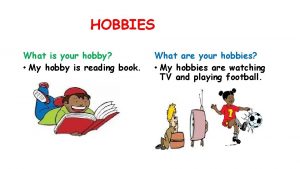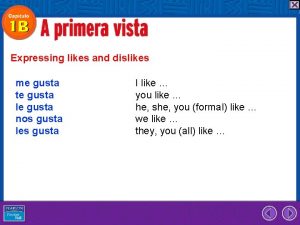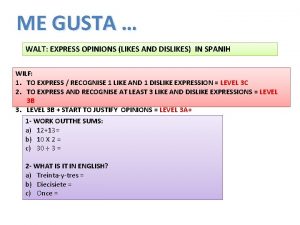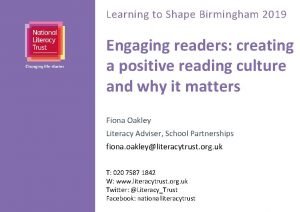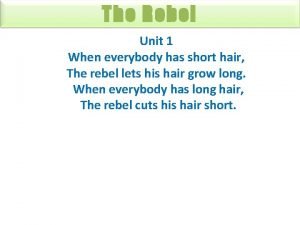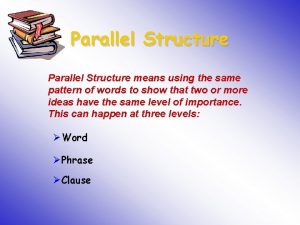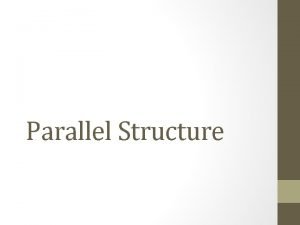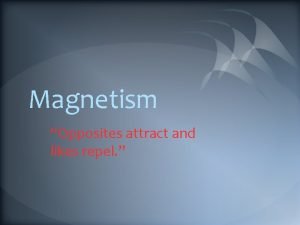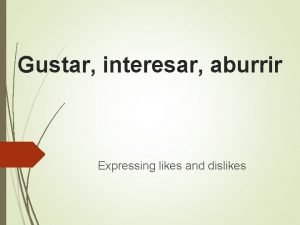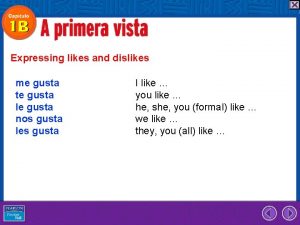Lecture 15 Expressing Likes and Dislikes Review of
















- Slides: 16

Lecture 15 Expressing Likes and Dislikes

Review of Lecture 14 • In lecture 14, we learnt how to – Differentiate between fiction and nonfiction – Analyze paragraph structure – Summarize paragraphs – Summarize essays and articles

Objectives of Lecture 15 • After completing lecture 15, you should be able to – Use gerunds and infinitives – Express likes and dislikes – Give preferences – Show indifference

Gerunds and Infinitives • A gerund is a noun made from a verb by adding "-ing. " The gerund form of the verb "read" is "reading. " You can use a gerund as the subject or the object of a sentence. – Reading helps you learn English. [SUBJECT OF SENTENCE] – I enjoy reading. [OBJECT OF SENTENCE] • Infinitives are the "to" form of the verb. The infinitive form of "learn" is "to learn. " You can also use an infinitive as the subject or the object of a sentence. – To learn is important. [SUBJECT OF SENTENCE] – He wants to learn. [OBJECT OF SENTENCE]

Using Gerunds and Infinitives • We use gerunds (verb + ing): – After certain verbs - I enjoy singing • enjoy, fancy, go, keep, suggest, avoid, recommend, etc. – After prepositions - I drank a cup of coffee before leaving – As the subject or object of a sentence - Swimming is good exercise • We use infinitives (to + verb): – After certain verbs - We decided to leave • agree, decide, hope, learn, would like, offer, wait, etc. – After many adjectives - It's difficult to get up early – To show purpose - I came to London to study English

Gerund or Infinitive 1. 2. 3. 4. 5. 6. 7. 8. 9. I don’t fancy (go out) tonight. going out She avoided (tell) him about her plans. telling I would like (attend) the party. to attend I dislike (wait) for the train. waiting He hopes (win) the match. to win I would love (come). to come I would prefer (help) him. to help Do you mind (turn off) the TV? turning off I’m planning (buy) a new mobile. to buy 10. Do you enjoy (watch) English movies? watching

Gerund or Infinitive Change in Meaning • Some verbs may follow a gerund or infinitive depending on the meaning: A. “He stopped smoking. ” B. “He stopped to smoke. ” A. “He remembered calling his friend. ” B. “He remembered to call his friend. ” A. “He tried closing the window. ” B. “He tried to close the window. ”

Expressing Likes • • I love …. I like …. I enjoy …. I’m crazy about …. I’m keen on …. I’m fond of …. … is my favourite … feels / sounds / looks good

Expressing Dislikes • • • I hate …. I don’t like …. I can’t stand …. I can’t bear …. I’m sick of …. I’m tired of …. … drives me crazy … annoys me … really bugs me … makes me mad / angry

Likes or Dislikes 1. I … eating Pizza on Saturdays. 2. My sister … tidying her room. 3. She … making dinner on Mondays. 4. Arthur … playing rugby with his friends. 5. My aunt … driving at night. 6. Your brothers … sleeping in the tent. 7. Those children … listening to the radio. 8. These men … working on Sundays. 9. My niece … reading adventure books. 10. Your father's friends. . . driving their cars when it is raining.

Dialogue 1 Fatima: Do you like playing badminton? Rida: Yes, I love it. What about you? Fatima: Oh, I don’t like playing it but I love watching it on TV. Rida: What else do you like to do in your free time? Fatima: Well, I’m fond of learning languages. I also enjoy cooking and gardening. Rida: Gardening? I can’t stand it.

Expressing Preferences • prefer + gerund – I prefer living in the city to living in the country. • would prefer + infinitive – I would prefer to meet him today. – Would you prefer to stay at home or go out? – I would prefer going out to staying at home. • would rather + bare infinitive – Would you rather play cricket? – I would rather go alone. – I would rather talk to him in person than call him on the phone.

Dialogue 2 Ali: Hi Sajid, Do you like cricket? Sajid: To be honest, I don’t really like it. I prefer football. Do you like it? Ali: Yes, I do. But I would rather watch it on TV than play it. Sajid: Oh, I enjoy playing it. In fact, I’m just going out to play right now. Would you like to join me? Ali: Oh, I’d love to watch your game but I can’t play. Sajid: As you like!

Expressing Indifference • • I don’t mind It doesn’t bother me It’s all the same to me It makes no difference to me It doesn’t matter to me I don’t care I couldn’t care less

Dialogue 3 Kiran: What should we cook today? Faisal: Whatever you like. It doesn’t matter to me. Kiran: How about chicken pulao? You love it, don’t you? Faisal: You know it’s my favorite. Let’s eat out today. Kiran: I’d rather cook it at home. I really don’t like it from the food street.

Summary of Lecture 15 • In lecture 15, you learnt how to – Use gerunds and infinitives – Express likes and dislikes – Give preferences – Show indifference
 10 likes and dislikes
10 likes and dislikes Hobbies and interests ideas
Hobbies and interests ideas Adjectives for likes and dislikes
Adjectives for likes and dislikes Likes and dislikes expressions
Likes and dislikes expressions Likes dislikes puzzles connections grid
Likes dislikes puzzles connections grid Likes and dislikes about school
Likes and dislikes about school What does the rebel do when everyone has short hair
What does the rebel do when everyone has short hair 01:640:244 lecture notes - lecture 15: plat, idah, farad
01:640:244 lecture notes - lecture 15: plat, idah, farad Brave new world chapter 7 questions
Brave new world chapter 7 questions Bruno dislikes sitting on the beach
Bruno dislikes sitting on the beach Simple compound complex and compound-complex sentences quiz
Simple compound complex and compound-complex sentences quiz The same pattern
The same pattern We found the film repulsive offensive and embarrassing
We found the film repulsive offensive and embarrassing Mary likes hiking swimming and to ride a bicycle
Mary likes hiking swimming and to ride a bicycle Ellen likes hiking, the rodeo, and to take afternoon naps.
Ellen likes hiking, the rodeo, and to take afternoon naps. Magnetic opposites attract
Magnetic opposites attract Choose the sentence that demonstrates parallel structure.
Choose the sentence that demonstrates parallel structure.

